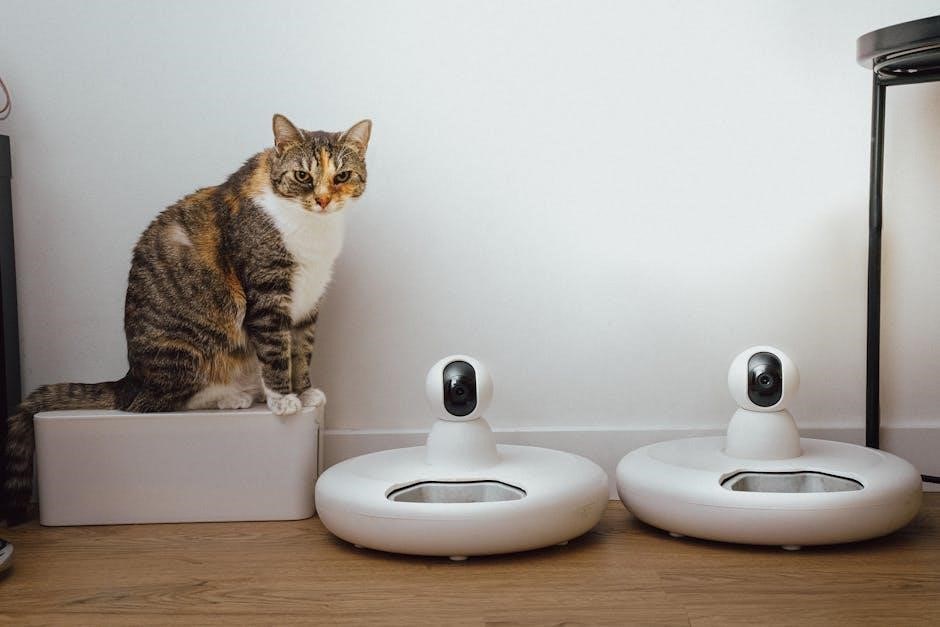The Smart Serve Certification is a mandatory training program for individuals serving alcohol in Ontario, ensuring responsible service practices and legal compliance. It focuses on alcohol laws, recognizing intoxication, and managing difficult situations. The certification is essential for bartenders, servers, and alcohol sellers, providing them with the knowledge to serve responsibly and avoid legal consequences. The exam includes multiple-choice questions, and preparation materials like PDF guides and practice tests are widely available to help candidates succeed.
1.1 Overview of Smart Serve Program
The Smart Serve program is a mandatory certification in Ontario for individuals involved in the sale or service of alcohol. It aims to promote responsible alcohol service, reduce alcohol-related harm, and ensure compliance with provincial laws. The program covers key areas such as alcohol laws, signs of intoxication, and effective intervention techniques. Designed for bartenders, servers, and alcohol vendors, it provides practical knowledge to handle real-world scenarios. The certification is valid for five years and requires passing an exam. Resources like PDF guides and practice tests are widely available to help candidates prepare effectively. The program emphasizes ethical serving practices and legal responsibilities, ensuring a safe environment for both staff and customers.
1.2 Importance of Smart Serve Certification
Smart Serve Certification is crucial for ensuring responsible alcohol service and legal compliance in Ontario. It reduces the risk of liability for establishments and staff, promoting a safer environment. The certification educates servers on recognizing intoxication, refusing service, and handling difficult situations, which helps prevent alcohol-related harm. It also protects businesses from potential legal consequences, such as fines or lawsuits. By obtaining the certification, individuals demonstrate professionalism and commitment to ethical practices. This training is mandatory for all alcohol servers in Ontario, making it a cornerstone of the hospitality industry. The certification not only benefits employers but also enhances public safety and trust in responsible service practices.
1.3 Who Needs Smart Serve Certification?
Smart Serve Certification is mandatory for anyone serving or selling alcohol in Ontario, including bartenders, servers, and retail staff. Managers and license holders also require certification to ensure compliance with alcohol laws. This includes individuals working in bars, restaurants, nightclubs, and retail stores selling alcohol; The certification is legally required for all staff involved in alcohol service, ensuring they understand responsible serving practices. It is essential for maintaining a safe environment, preventing underage drinking, and avoiding legal consequences. Employers must verify that all staff are certified before allowing them to handle alcohol sales or service. This certification is a critical requirement for anyone in the hospitality or retail alcohol industry in Ontario.

Smart Serve Exam Structure
The Smart Serve exam is a multiple-choice test with 30 questions, assessing knowledge of alcohol laws, responsible service, and intervention techniques. The exam is timed, lasting 45 minutes.
2.1 Types of Questions on the Exam
The Smart Serve exam features multiple-choice questions designed to test knowledge on alcohol laws, signs of intoxication, and responsible serving practices. Questions are straightforward, requiring candidates to select the correct answer from four options. Some questions focus on scenarios, assessing how to handle difficult situations, such as refusing service to intoxicated patrons. Others cover legal aspects, like permissible serving hours and civil liability. The exam also includes true/false questions to verify understanding of specific regulations. All questions are based on the Smart Serve training material, ensuring candidates apply what they’ve learned to real-world situations.
2.2 Duration and Format of the Exam
The Smart Serve exam is designed to be completed within a specific time frame, typically 60 minutes, and consists of multiple-choice questions. Candidates are required to answer all questions within this period, and the exam is delivered in an online format. The test is structured to ensure fairness and accessibility, with clear instructions provided at the start. Once a question is answered, candidates cannot revisit it, emphasizing the importance of careful consideration. The format is straightforward, allowing candidates to focus on demonstrating their knowledge of responsible alcohol service practices and legal requirements. This setup ensures a consistent and standardized evaluation process for all participants.
2.3 Passing Score and Grading Criteria
To pass the Smart Serve exam, candidates must achieve a score of at least 80%. The grading system is based on the number of correct answers provided, with each question contributing equally to the final score. The exam is immediately graded upon completion, and results are displayed right away. Candidates who meet or exceed the passing score are issued a Smart Serve certification, which is valid indefinitely. The grading criteria are designed to ensure a fair and consistent evaluation of knowledge related to responsible alcohol service, legal requirements, and practical scenarios; Accuracy and understanding of key concepts are essential to achieving a passing score.

Key Topics Covered in Smart Serve Exam
The exam covers alcohol laws, signs of intoxication, responsible serving practices, and handling difficult situations, ensuring servers understand legal and ethical responsibilities when serving alcohol.
3.1 Alcohol Laws and Regulations
This section covers essential alcohol laws and regulations, including legal drinking age, permissible serving hours, and requirements for selling alcohol. It also addresses restrictions on self-serve alcohol stations and the importance of maintaining a safe environment. Understanding these laws helps servers comply with provincial regulations and avoid legal issues. The exam questions focus on practical scenarios, ensuring servers can apply legal knowledge effectively. Proper training and adherence to these regulations are crucial for responsible alcohol service and maintaining public safety. Servers must stay updated on any changes in legislation to ensure compliance and provide excellent service.
3.2 Signs of Intoxication and Intervention
Recognizing signs of intoxication is crucial for responsible alcohol service. Common indicators include slurred speech, unsteady movements, and mood changes. Servers must intervene appropriately to prevent over-serving, ensuring customer safety and legal compliance. The traffic light system is often used to assess intoxication levels, guiding staff on when to refuse service or offer assistance. Effective communication techniques, such as asking about designated drivers or assessing mood, are key strategies. Proper intervention helps prevent alcohol-related incidents and promotes a safe environment. Understanding these signs and interventions is a core component of the Smart Serve Certification, ensuring servers can handle situations professionally and ethically. Regular training updates are essential to stay informed on best practices.
Responsible alcohol service practices are essential to ensure legal compliance and customer safety. Key strategies include monitoring consumption, refusing service to intoxicated individuals, and offering food and water. Servers must verify age, use standardized measuring tools, and avoid promotions that encourage over-drinking. Effective communication and conflict resolution skills are vital to handle difficult situations. Regular staff training and adherence to local alcohol laws further enhance responsible practices. These methods help prevent alcohol-related harm and maintain a safe environment for both patrons and staff. Understanding these practices is a critical part of the Smart Serve Certification, equipping servers with the skills to serve responsibly and ethically. Handling difficult situations is a critical component of Smart Serve Certification, focusing on de-escalation techniques and conflict resolution. Servers must remain calm, patient, and professional when dealing with intoxicated or unruly customers. Key strategies include active listening, empathetic communication, and clear boundary-setting. Refusing service to intoxicated individuals is essential, and documenting incidents can provide legal protection. Understanding legal implications, such as civil liability, emphasizes the importance of responsible intervention. Practical examples from exam questions highlight scenarios like managing refusal of service, addressing aggressive behavior, and resolving conflicts without escalation. Mastering these skills ensures a safe environment for both staff and patrons, aligning with the certification’s goals.
Effective preparation involves utilizing study materials, practice tests, and time management techniques. Reviewing key concepts and taking mock exams enhances understanding and readiness for the actual test. To excel on the Smart Serve exam, candidates should utilize official study guides, online resources, and practice tests. PDF materials available online provide comprehensive overviews of key topics like alcohol laws, signs of intoxication, and responsible serving practices. These resources often include sample questions with answers, enabling candidates to familiarize themselves with the exam format and content. Additionally, flashcards and interactive study tools can reinforce learning and retention. It is crucial to select materials that align with the most recent exam updates to ensure relevance and effectiveness in preparation. Proper resource selection and consistent study are essential for achieving certification. Practice tests and mock exams are invaluable tools for preparing for the Smart Serve exam. They allow candidates to assess their knowledge, identify weak areas, and familiarize themselves with the exam format. Many online resources offer downloadable PDFs containing sample questions and answers, enabling candidates to simulate real test conditions. Mock exams help build confidence and time management skills, as they replicate the pressure of a live exam. Regularly taking practice tests ensures that candidates are well-prepared for the types of questions they will encounter. By consistently using these tools, individuals can refine their understanding of key concepts and improve their readiness for the certification exam. Effective time management is crucial for success in the Smart Serve exam. Allocate a specific amount of time to each question based on its difficulty and the marks assigned. Prioritize answering questions you are confident about first, then return to challenging ones if time permits. Practice tests and mock exams help refine your pacing and ensure you complete the exam within the allotted time. Reviewing key concepts beforehand reduces hesitation during the test. Additionally, using flashcards to memorize important terms and concepts can save valuable time during the exam. By managing your time wisely, you can answer questions accurately and efficiently, ensuring a better overall performance. The Smart Serve exam features multiple-choice questions covering alcohol laws, signs of intoxication, and responsible serving practices. Answers are provided in study guides and PDF materials online. Common questions include understanding permissible alcohol service hours, handling refused service situations, and recognizing signs of intoxication. Many candidates ask about civil liability, which refers to legal consequences if harm occurs due to over-serving. Others inquire about effective monitoring techniques, such as using different glassware or tracking consumption levels. Additionally, questions about exam format, like the number of multiple-choice questions and time limits, are frequent. Resources like PDF guides and online practice tests provide detailed answers, ensuring candidates are well-prepared for the exam. These FAQs highlight key areas to focus on for successful certification. Candidates often overlook the traffic light system for customer screening and fail to monitor alcohol consumption effectively. Many misinterpret civil liability, confusing legal consequences with criminal charges. Others underestimate the importance of ethical practices, such as refusing service to intoxicated patrons. Time management is another pitfall, as some spend too long on single questions. Additionally, neglecting to review answers or skipping questions entirely can lead to unnecessary errors. Overreliance on guesswork without eliminating wrong options is a common mistake. Lastly, some candidates fail to familiarize themselves with exam formats, leading to confusion during the test. Avoiding these errors ensures better performance and higher chances of passing. Question 1: What are the permissible hours for selling and serving alcohol in a licensed establishment? Question 2: Which of the following is a sign of intoxication? Question 3: What is civil liability in the context of alcohol service? These sample questions highlight key concepts like legal hours, recognizing intoxication, and understanding liability. Reviewing such questions helps candidates prepare effectively for the exam. Understanding civil liability, ethical serving practices, and privacy is crucial. Servers must avoid illegal actions, respect patrons’ rights, and maintain confidentiality to ensure responsible alcohol service. Civil liability refers to legal responsibility for damages caused by overserving alcohol. Servers can face lawsuits if patrons harm themselves or others after being served. Legal implications include potential fines and criminal charges for violating alcohol laws. Understanding these risks emphasizes the importance of responsible serving practices. Proper training, like Smart Serve, helps mitigate these risks by educating staff on legal boundaries and intervention techniques. Staying informed about local regulations and adhering to them is essential to avoid legal consequences. This knowledge is crucial for anyone serving alcohol to ensure compliance and protect themselves and their establishment from liability. Ethical serving practices are fundamental to ensuring a safe and responsible environment for both customers and staff. These practices include refusing service to intoxicated patrons, verifying legal drinking age, and avoiding over-serving. Servers should maintain professionalism, treating all customers with respect and fairness. Ethical practices also involve being vigilant about signs of intoxication and taking appropriate intervention steps. Upholding these standards not only protects the establishment from legal risks but also promotes a positive and safe atmosphere. Ethical serving is a core principle of the Smart Serve program, emphasizing the importance of responsibility and integrity in alcohol service. By adhering to these practices, servers contribute to a culture of safety and respect. Maintaining privacy and confidentiality is crucial when handling customer information and sensitive situations in alcohol service. Servers must respect patrons’ personal information and avoid sharing details without consent. Confidentiality extends to incidents involving intoxication or refusal of service, ensuring dignity and privacy for all parties. Breaching these principles can lead to legal consequences and damage to the establishment’s reputation. The Smart Serve program emphasizes the importance of ethical handling of customer data and discreet management of challenging situations. By upholding privacy and confidentiality, servers foster trust and professionalism, contributing to a respectful and secure environment for everyone involved. This ethical approach is integral to responsible alcohol service practices. Practical serving skills involve monitoring customer consumption, handling refusals, and communicating effectively. Servers must balance hospitality with responsibility, ensuring safe alcohol service and managing challenging situations professionally. Monitoring customer consumption is crucial for responsible alcohol service. Servers should observe the number of drinks consumed, assess intoxication signs, and ensure patrons drink at a safe pace. Techniques include using drink tracking systems, maintaining awareness of high-alcohol beverages, and offering water or food. Effective monitoring helps prevent over-serving, reducing risks of liability and ensuring customer safety; Regular checks and open communication with patrons are key strategies to maintain control and foster a responsible drinking environment. Servers must remain vigilant to identify and address potential issues early, ensuring compliance with legal standards and ethical practices. This proactive approach supports both patrons and establishments. Handling refusals and conflicts in alcohol service requires diplomacy and professionalism. Servers must remain calm, listen actively, and avoid confrontations. When refusing service, it’s essential to communicate clearly and respectfully, offering alternatives like water or food. De-escalation techniques, such as acknowledging the patron’s feelings and maintaining a non-confrontational tone, help prevent conflicts. If situations escalate, involving management or security is crucial. Legal implications, including civil liability, emphasize the importance of proper refusal practices. Effective communication and empathy are key to resolving conflicts while ensuring compliance with alcohol laws and maintaining a safe environment for both staff and patrons. Proper training in conflict resolution is vital for servers to manage such situations effectively. Effective communication is crucial for responsible alcohol service. Active listening, clear speech, and non-verbal cues help ensure understanding. Asking open-ended questions encourages patrons to share their needs, while maintaining a respectful and empathetic tone builds trust. Clarifying orders and confirming preferences prevents misunderstandings. Non-verbal signals, like nodding or eye contact, show engagement. When refusing service, honesty and professionalism are key to maintaining dignity. Effective communication also involves knowing when to involve management or security. These techniques ensure compliance with alcohol laws, reduce conflicts, and promote a positive customer experience. Proper training in communication strategies is essential for servers to handle diverse situations confidently and professionally. Clear and respectful interactions are vital for maintaining a safe and respectful environment. Utilize study guides, practice tests, and flashcards to reinforce key concepts. Review alcohol laws, signs of intoxication, and responsible serving practices. Manage time effectively during the exam. The Smart Serve exam consists of multiple-choice questions designed to test knowledge on alcohol service laws, signs of intoxication, and responsible serving practices. The exam format is straightforward, with a set number of questions that must be answered within a specific time frame. Candidates should familiarize themselves with the question structure and timing to ensure they can complete the exam confidently. Understanding the format helps in managing time effectively and reduces anxiety during the test. Additionally, reviewing the exam structure in study guides or practice tests can provide a clear idea of what to expect, aiding in better preparation and performance. Reviewing key concepts is essential for excelling in the Smart Serve exam. Focus on understanding alcohol laws, recognizing signs of intoxication, and mastering responsible serving practices. Study materials, such as PDF guides, highlight these areas, ensuring comprehensive knowledge. Practice tests and flashcards can reinforce learning, helping to identify weak areas. Pay attention to common exam questions, such as permissible serving hours or civil liability definitions. Regularly reviewing these topics ensures familiarity and confidence. Allocate time to revisit challenging sections, as a strong grasp of key concepts directly impacts exam performance. Consistent review also helps in applying knowledge effectively during real-life scenarios, making it a critical step in certification preparation.
Flashcards and study guides are valuable tools for preparing for the Smart Serve exam. Flashcards help memorize key terms and concepts, such as alcohol laws and signs of intoxication, through repetition and quick recall. Study guides provide detailed explanations and examples, ensuring a deep understanding of responsible serving practices. Utilizing these resources allows candidates to target weak areas and reinforce their knowledge. Many study guides are available in PDF format, offering convenience and portability. By incorporating flashcards and guides into a study routine, individuals can efficiently prepare for the exam and feel confident in their ability to answer questions accurately. Regular use of these tools enhances retention and improves overall exam performance. Key resources for Smart Serve exam success include recommended study guides, online practice tests, and PDF materials. These tools provide comprehensive preparation, ensuring a thorough understanding of exam topics. Official Smart Serve study guides are essential for exam preparation, offering comprehensive insights into alcohol laws, signs of intoxication, and responsible serving practices. These guides are available in PDF format and include sample questions, ensuring familiarity with the exam structure. Additionally, online resources like practice tests and flashcards provide interactive learning opportunities. Many candidates benefit from study apps that offer customizable learning experiences. The Smart Serve website itself is a primary source for authentic materials, ensuring accuracy and relevance; By utilizing these recommended study guides, candidates can systematically review key concepts, improve knowledge retention, and build confidence for the exam. They are indispensable tools for achieving success in the Smart Serve certification. Online practice tests are invaluable for preparing for the Smart Serve exam, offering a realistic simulation of the actual test environment. These tests include multiple-choice questions similar to those on the exam, covering topics like alcohol laws, signs of intoxication, and responsible serving practices. Many resources provide answers with detailed explanations, helping candidates understand their mistakes. Regularly taking these tests improves knowledge retention and reduces exam anxiety. Additionally, online platforms often track progress, highlighting areas that need more review. Accessible anytime, these tests are a flexible and effective way to gauge readiness and refine understanding of the material. They are a key component of a comprehensive study plan for Smart Serve certification. Smart Serve Exam PDF materials are comprehensive resources designed to help candidates prepare effectively for the certification exam. These documents typically include practice questions, answers, and detailed explanations, covering key topics such as alcohol laws, signs of intoxication, and responsible serving practices. Many PDF guides are updated regularly to reflect the latest exam content, ensuring candidates access the most relevant information. They often feature sample questions similar to those on the actual exam, allowing individuals to familiarize themselves with the format and timing. Additionally, these materials are easily downloadable and can be studied offline, making them a convenient option for self-paced learning. They are an essential tool for anyone aiming to excel on the Smart Serve exam. Staying calm and confident during the exam is crucial. Review last-minute tips to ensure readiness. Continuous learning reinforces responsible alcohol service and legal compliance. Staying calm and confident during the Smart Serve exam is essential for success. Proper mental preparation and a positive mindset can significantly reduce anxiety. Start by arriving early to familiarize yourself with the environment. Take deep breaths to relax and maintain focus. Skim through the questions to identify easier ones first, building momentum and confidence. Avoid overthinking and trust the knowledge gained from study materials. Remember, the exam is a tool to ensure responsible alcohol service, not a measure of personal worth. Stay composed, read each question carefully, and answer to the best of your ability. Confidence grows with preparation—stay calm, focus, and succeed. Reviewing last-minute tips before the Smart Serve exam can enhance performance. Ensure you arrive early to complete any necessary check-ins. Skim through the entire exam first to identify easier questions and manage your time effectively. Allocate a set amount of time per question to avoid spending too long on one. Practice with sample questions to familiarize yourself with the format. Focus on understanding key concepts like alcohol laws, signs of intoxication, and responsible serving practices. Use elimination techniques for unclear answers, and never leave a question blank. Stay calm, read carefully, and trust your preparation. Last-minute reviews of flashcards or study guides can also reinforce critical information. Continuous learning is essential for maintaining Smart Serve Certification effectiveness. Alcohol laws and regulations evolve, requiring ongoing education to stay compliant. Regularly reviewing study materials, such as PDF guides and practice exams, ensures up-to-date knowledge. Engaging in workshops or online refresher courses can deepen understanding of responsible serving practices. Continuous learning also enhances practical skills, like identifying signs of intoxication and handling difficult situations confidently. By staying informed, individuals can adapt to new scenarios and maintain high standards of service. This commitment not only supports professional growth but also contributes to a safer environment for customers and staff. Continuous learning reinforces the principles of ethical and responsible alcohol service.3.3 Responsible Alcohol Service Practices
3.4 Handling Difficult Situations

Preparation Strategies for the Exam
4.1 Study Materials and Resources
4.2 Practice Tests and Mock Exams
4.3 Time Management Tips

Smart Serve Exam Questions and Answers
5.1 Frequently Asked Questions
5.2 Common Mistakes to Avoid

5.3 Sample Questions and Solutions
Answer: Generally, alcohol can be sold and served between 9 AM and 2 AM, unless otherwise specified by local regulations.
Answer: Slurred speech, unsteady balance, or aggressive behavior are common indicators of intoxication.
Answer: Civil liability refers to the legal responsibility of being sued for damages if an intoxicated patron causes harm after being served. 
Legal and Ethical Considerations
6.1 Civil Liability and Legal Implications
6.2 Ethical Serving Practices
6.3 Privacy and Confidentiality

Practical Serving Skills
7.1 Monitoring Customer Consumption
7.2 Handling Refusals and Conflicts
7.3 Effective Communication Techniques

Exam Preparation Tips
8.1 Understanding the Exam Format
8.2 Reviewing Key Concepts
8.3 Utilizing Flashcards and Study Guides

Resources for Exam Success
9.1 Recommended Study Guides
9.2 Online Practice Tests
9.3 Smart Serve Exam PDF Materials
10.1 Staying Calm and Confident
10.2 Reviewing Last-Minute Tips
10.3 Importance of Continuous Learning



